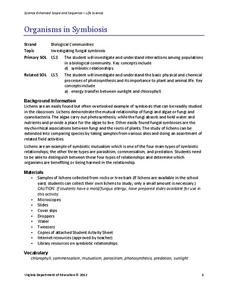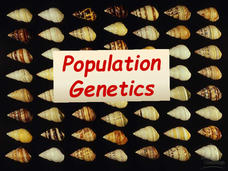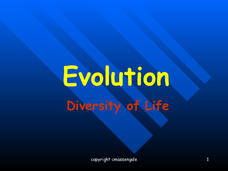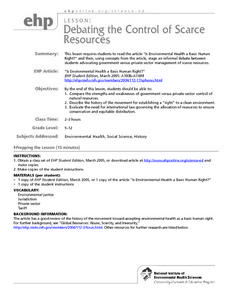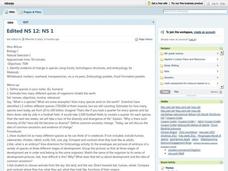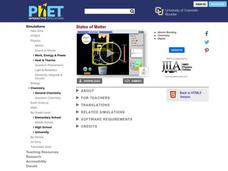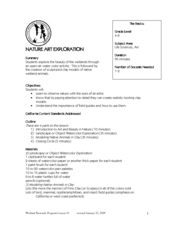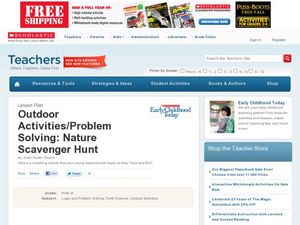The Science Spot
Flower Basics
Learn about plants and pollination with a instructional activity about the parts of a flower. After labeling the anatomy of a flower using a word bank, kids explain the difference between self-pollination and cross-pollination, and...
Museum of Science
Egg Carton Nursery
Observe nature in action. Young biologists make plant nurseries from cardboard egg cartons. Once the seeds sprout, they move the flowering plants outside and make observations of bees that pollinate the flowers.
Virginia Department of Education
Atomic Structure: Elements
It's all relevant, really. Individuals use the scientific method to learn more about elements, atoms, and their placement on the periodic table. They conduct experiments using materials common in nature to explore how elements affect our...
Virginia Department of Education
Organisms in Symbiosis
Searching for an activity that allows emerging biologists to explore symbiosis up close and personal? Pupils collect samples and view lichens through a microscope and conclude with a discussion about the relationship they have with other...
Biology Junction
Population Genetics
Genetic variation shows the health of a population, yet cheetahs show very little variation over that last 10,000 years. Scholars learn the importance of genetic variation in populations after viewing an informative presentation. It...
Biology Junction
Evolution – Diversity of Life
Scientists noticed animals with backbones share similar bone structure despite having different forms, such as fins, arms, and wings. Young scientists gain an appreciation for evolution by understanding the history of the theory. They...
Serendip
The Ecology of Lyme Disease
Areas that previously included no risk of Lyme disease now have cases every year. Scholars learn about the spread of Lyme disease and the relationship with ecological succession. Then, they discuss possible solutions using the known food...
Curated OER
Debating the Control of Scarce Resources
Students examine the issue of government versus private sector control of natural resources. They read an article, evaluate the need for international law governing resource allocation, and participate in a class debate.
Curated OER
The Perfect Cow?
High schoolers examine how cattle have evolved through natural selection and selective breeding. In this natural selection lesson students compare and contrast natural and artificial selection.
Curated OER
Natural Selection
Students estimate how many different species of organisms inhabit the Earth. In groups, they match the pictures of embryos at the different stages of development. They compare and contrast animals from the sky, land, and water and...
Scholastic
Study Jams! Landforms
First-class photographs dazzle your class as they are acquainted with Earth's various landforms. To reinforce learning, they can take a multiple-choice quiz, sing along to a karaoke song, or review key vocabulary terms, all on this...
Curated OER
once and future MOON
Beyond the phases of the moon, this comprehensive lesson plan covers geologic history and geology. Amateur astronauts examine photos of the lunar landscape, experiment with the creation of craters, and delve into information about the...
Curated OER
The Big Squeeze
Students observe what happens as crayon shavings are melted and/or pressed together. They compare this to the process some rocks go through as they are heated and compressed naturally on earth.
Curated OER
Evolution worksheet
Looking at evolution in detail, this thorough worksheet has complex questions requiring details and explanations of natural selection and diversity. Various examples of biological characteristics are available, and students choose the...
Georgia Department of Education
Native Americans in Georgia History
Let your learners find out firsthand what hunting and gathering was really like, with a role-play activity they will remember for years. The class researches how indigenous people used plants and animals to survive while respecting and...
PhET
Isotopes and Atomic Mass
Some isotopes are unstable, or radioactive, meaning they will decay over time and turn into another isotope or stable element. In the interactive simulation, participants manipulate elements to create isotopes and gather information....
PhET
States of Matter
Water is the only molecule on Earth that can naturally exist in all three states of matter. The interactive simulation shows different molecules changing states of matter with the addition or removal of heat. Learners then see how...
American Chemical Society
Neutralizing Acids and Bases
Most things naturally strive for balance, and acids and bases are no exception. Neutralization of acids and bases allows scholars to explore the color changes associated with the pH scale. After this exploration, pupils neutralize two...
Curated OER
Natural Phenomena That Change the Earth's Surface
Young scholars explore a natural phenomenon. In this science instructional activity, students research a natural phenomenon and create a script about that phenomenon. Young scholars act out their scripts for the class.
Curated OER
Nature and Nurture
Students look into the role both nature and nurture play in determining an individual's traits. They examine how genes and the environment affect personality
Curated OER
Nature And Nurture
Learners develop an understanding of the role both nature and nurture play in determining an individual's traits. Using a website, students answer questions about nature and nurture in order to solve the riddle, What do you call a smart...
Curated OER
Nature Art Exploration
Students draw a nature landscape using watercolors. In this life science lesson, students share their personal experience on the beauty of nature. They create clay models of different native animals.
Curated OER
Nature: Planting Terrariums
Students observe and experiment using a terrarium. In this scientific lesson plan, students build a nature terrarium. Students then observe their terrarium over a period of time to discover what makes the plants grow. A science...
Curated OER
Outdoor Activities/Problem Solving: Nature Scavenger Hunt
Students act as young explorers on this scavenger hunt. In this early childhood lesson plan, students build problem-solving and visual discrimination skills as they search outdoors to find matching nature items.
Other popular searches
- History and Nature of Science
- The Nature of Science
- Nature of Science Biology
- Nature of Science Inquiry
- Nature of Science Physics
- History Nature of Science
- Science Patterns in Nature
- Genetics Nature of Science
- Teaching Nature of Science
- Nature of Science Weather
- Genetic Nature of Science
- Science and Nature





